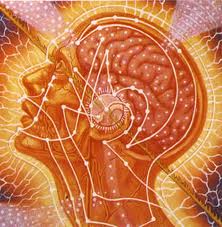I often speak in class about how the postures that we practice on the mat create a change in our brain chemistry, with noticeable and measurable effects on our lives. Here is an article from the Kripalu Center website that shares some of the latest research on yoga and the brain:
How Yoga Changes the Brain
by Angela Wilson
For many of us, the practice of yoga helps us
feel calmer and more soothed. We go into class feeling stressed from the day’s
activities, and we leave with a little more ease. So what’s happening in the
brain, as a result of yoga, that produces these feelings? With the steady rise
in the number of people practicing yoga—from 13 million in 2007 to more than 20
million today—researchers have begun to focus their attention on how yoga
actually changes the brain. The results echo what many of us experience:
Studies show that yoga increases relaxation in the brain, improves areas of the
brain that help us manage pain, and protects us against age-related decline.
Together, these benefits begin to reveal the scientifically validated effects
of yoga practice on brain health.
Yoga Floods the Brain with Relaxation
To investigate why yoga induces feelings of calm
and peacefulness, Dr. Chris Streeter and her research team from Boston
University set out to discover whether practice helps our brains produce more
GABA, a neurotransmitter that increases feelings of relaxation. When we don’t
have enough GABA in our brains, we feel anxious or depressed; medications such
as Xanax work by upping GABA levels.
To answer this question, the team had one group
of subjects do yoga for 60 minutes, while a control group read for an hour.
Both groups were scanned in the MRI pre- and post-intervention. Would yoga
release more GABA in the brain than reading?
The results were an unequivocal yes. The
yoga group had a 27 percent increase in GABA, while the readers had no
increase. But to rule out the possibility that any type of physical movement
can increase GABA levels, Chris ran a second study, comparing the effects of
yoga with those of walking. Again, the yoga practice showed greater changes in
GABA levels in the brain. Not surprisingly, the increase in GABA was correlated
with self-reports of decreased anxiety.
Studies such as these suggest how yoga might be
used as an adjunct treatment to mental-health conditions such as anxiety and
depression, and point to how yoga positively impacts the brain.
Yoga Improves Regions of the Brain that Manage
Pain
Yoga has also been shown to improve pain
tolerance. A study
conducted by a group of pain experts found that, compared to matched controls,
yogis could tolerate pain twice as long. This subjective difference was
correlated with distinct brain differences in both of these groups: The yoga
practitioners had larger insular gray matter volume than those who didn’t do
yoga. The insula is a region of the brain in the cerebral cortex that helps
regulate body temperature and maintain homeostasis; is related to perception
and self-awareness; and has a role in regulating the parasympathetic nervous
system, the branch of the nervous system that helps us feel calmer and more
relaxed.
Researchers believe that yoga offers a
combination of physical practice, conscious breathing, and cognitive frameworks
(for example, the idea of seeing pain as “sensation,” without labeling it as
“good” or “bad”) that allows us to manage and tolerate pain with more ease.
Yoga Protects Against Age-Related Decline
A 2014 study by a team that included two
researchers affiliated with the Kripalu Institute for Extraordinary Living, Tim
Gard and Sara Lazar of Massachusetts General Hospital, found that the long-term
practice of yoga has several buffering effects on
age-related decline. The study compared longtime yoga and meditation
practitioners with control subjects of the same age and demographics.
Specifically, the researchers were curious whether or not yoga and meditation
would help maintain fluid intelligence—the ability to cope with novel
situations and engage in abstract thinking—a function that notoriously declines
with age.
To explore these questions, Tim and Sara invited
16 Kripalu Yoga practitioners, 16 vipassana meditators, and 15 controls into
the lab to have their brains scanned with MRI/fMRI technology and to undergo
cognitive testing for fluid intelligence. The yogis and meditators all had at
least 20 years of extensive practice under their belts (total practice hours
ranged from 7,400 to 13,000 each). Control subjects were matched for age,
education, exercise, race, and reading ability.
Results indicated that, as hypothesized,
long-term practice of yoga and meditation buffered against age-related decline.
Both yogis and meditators had higher average scores on fluid intelligence tests
than controls. In addition, these two groups had higher scores on mindfulness
questionnaires than controls. Previous studies suggest that both fluid
intelligence and mindfulness are related to cognitive flexibility (the ability
to adapt to and cope with stress). Additional studies might tweeze out more
differences between the groups, but these initial results indicate that the
long-term practice of meditation and yoga protects cognitive abilities well
into older age.
Studies such as these are essential in
understanding not only that yoga works, but also how it works. These findings
add to a growing body of research on how yoga might be beneficial not just for
healthy people, but for clinical populations—those suffering from depression,
anxiety, even dementia. Continued investigation in how and why these practices
induce change will help us deepen our understanding of their clinical
applications for improved brain health.
Angela Wilson, MA, is a Kripalu Healthy Living faculty member who teaches on the science of yoga. She is a licensed mental health counselor and has contributed to Yoga International and Yoga Therapy Today, writing about the intersection between yoga, Western psychology, and science.


